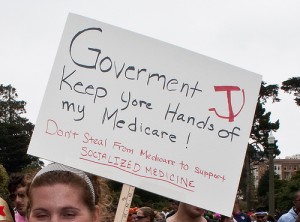Yikes! Do the majority of Americans really think that the U.S. government is a threat to our freedom and personal liberties? According to the Pew Research Center for the People & the Press, the answer is “Yes” — for the first time since they began conducting this survey on a triennial basis in 1958. Pew conducted this national survey by telephone January 9th-13th with a sampling of 1,502 adults. When asked “Do you think the federal government threatens your own personal rights and freedoms, or not?” 53% answered “Yes,” 43% answered “No,” and 4% either didn’t know or declined to state. Amongst those who answered “Yes,” 31% believe the U.S. government poses a “major threat.”
Here are some other highlights for those who lack the time or inclination to read this report:
- Surprise! Conservatives are not just bat sh*t crazy, they’re paranoid too: 76% of “conservative Republicans” (as opposed to some OTHER kind of Republicans?) said that the federal government “threatens their personal rights and freedoms” and 54% regard them as a “major” threat. Maybe that’s because Federal Courts prevented the GOP from exercising their “personal rights and freedoms” to prevent low-income, senior, student and minority people from voting in the 2012 election. Or maybe it’s because they don’t want Obamanazis coming for their guns.
- … Yet a surprising number of registered Democrats agree with them: 38% shared their Republican fellow citizens’ belief that the feds are a threat to our personal rights and freedoms, and 16% agree that its a MAJOR threat. I wish the folks at Pew Research has asked whether they grow medical marijuana and oppose mandatory childhood vaccinations and fluoride in the water, ’cause we’ve got a lotta those out here on the Left Coast.
- We plain ol’ don’t trust them varmints: Only 26% — just over a quarter — say they can “trust the government in Washington to do the right thing” all or most of the time, while 73% believe we can only trust them sometimes or never. Even when broken down by political views, gender, ethnicity, age, and education level, the responses vary by less than 20%. A whopping 68% — over two thirds — of respondents view Congress unfavorably. But they make Congress look good, considering that Gallup’s August 2012 poll ranked them at a dismal 10%. So why don’t we boot them out? Do we all like our own representatives and senators, but not anyone else’s?
- Partisan differences have dramatically increased, who knew? People whose party controls the White House have expressed a higher level of trust since Pew first began conducting this survey in 1958. But — as many of us would guess — “partisan differences in trust in government have been much wider during the Bush and Obama administrations than during previous administrations.” Today’s political impasse surely must have something to do with race. While many liberals have challenged the legitimacy of George W. Bush’s presidency and his policies, a shocking number of conservatives don’t even believe Obama had the right to run. Our president’s father’s heritage definitely shows how history can come around and bite us in the butt sometimes, even if Kenya actually IS on the opposite coast of Africa from where most of America’s slaves came from.
But the numbers don’t tell the whole story. Although Pew Research’s polls do have an excellent reputation for reliability, and were ranked by Daily Kos as the most accurate for Election 2012, along with ABC and the Washington Post, a lot depends on what questions we are asked and how these questions are phrased.
The Devil You Know …
First of all, people tend to trust the devil they know over the devil they don’t know. That’s why a September 2012 Gallup poll found that — although we frown on the feds — 65% of us trust our state governments and 74% of us trust our local governments. This also explains why we feel so disgusted with congress, but keep sending our own senators and representatives back to Washington. Many popular and essential programs that are run at the local and state levels — most notably our schools — are at least partially paid for by the federal government. Like the Tea Partier who famously demanded that the U.S. Government “keep their hands off my medicare,” many of us don’t realize that so many of the programs we rely on — including ones run by local governments, charities and private institutions — are overseen by and/or receive funding from Washington.
Suzanne Mettler explains in her New York Times Op Ed piece, “Our Hidden Government Benefits,” that when the Cornell Survey Research Institute surveyed 1400 people back in 2008, and asked if they had “ever used a government social program,” 57% denied ever doing so. When later asked if they participated in Social Security, unemployment insurance, student loans, the home mortgage-interest deduction, and 17 other federally-sponsored programs, it turned out that an astonishing 94% had benefited from at LEAST one, and the average respondent had participated in FOUR. Obviously, a whole lot of people don’t have a clear understanding of our federal government’s role as a safety net and economic stabilizer in our society. The most disturbing revelation from Cornell’s study was that only 44% of respondents even realized that Social Security is a government-run program. Sure, it’s an earned benefit, to which they’ve contributed their entire working lives. But the only reason folks keep getting those checks, despite losing the value of their homes and 401Ks is because those checks are guaranteed by the U.S. government.
Metteler concludes:
“The threat to democracy today is not the size of government but rather the hidden form that so much of its growth has taken. If those who assume government has never helped them could see how it has, it might help defuse our polarized political climate and reinvigorate informed citizenship.”
And Metteler definitely has a point. The “hidden” nature of the U.S. government’s benefits to society have enabled conservatives to nibble holes in our safety net, and then — when we start falling through the holes they’ve created — claim that “big government doesn’t work.” Because Social Security’s so popular and successful, conservatives can’t seem to get rid of it. No wonder they’re so desperate to convince younger generations that it won’t be around.
Different Survey, Different Results
An August 2012 survey of 1,000 people conducted by Ipsos Public Affairs for the National Treasury Employees Union asked a different set of questions and found that the majority of Americans support services provided by the Federal government, want these services continued, and even want some of these services to be increased.
The NTEU’s public survey shows that even if most Americans distrust the Federal Government, they still trust them more than anyone else:
- 67% of respondents support public services from the Federal government, and agreed that “Congress should raise taxes on the wealthiest Americans before cutting funding for public services such as food and drug safety and border security.”
- 77% said they believed that “wealthy Americans should pay their fair share towards deficit reduction and economic recovery.”
- 69% want the feds to commit more resources to food safety, 72% want more border security; 86% want more help for our veterans; 66% want more resources for ensuring the safety of medical devices; and 58% want more nuclear oversight.
- 67%-91% of Republicans surveyed support the same or more levels of resources and manpower in the above areas as their Democratic fellow respondents.
- 70% of independents agree that congress should raise taxes on the wealthiest Americans before cutting funding for the above-mentioned public services.
So why do we have such a huge discrepancy between Americans’ negative feelings towards the federal government, and their positive feelings for the services our federal government provides?
Why Government Is Good
Government Is Good — a website run by Douglas J. Amy, a professor of politics at Mount Holyoke College — points out that “poll questions that ask about government in the abstract can be very misleading … If we go beyond questions about government in general and begin to ask more specific questions about this institution, we see that many Americans express strong – often very strong – support for government and its programs.”
Here are Amy’s findings:
- Over half of people react negatively to “government regulation of business,” but are “more likely to say they want more regulation than they are to say they want less” when asked about specific areas that directly effect them and their loved ones, including healthcare and automobile safety.
- 45% of Americans claim they want “a smaller government providing fewer services,” while 42% say they want “a bigger government providing more services.” This seems like a nearly even split, until people are questioned about more specific issues.
- Nearly “three quarters of Americans say they want to see more federal involvement in ensuring access to affordable health care, providing a decent standard of living for the elderly, and making sure that food and medicines are safe.”
- Over “60% want more government involvement in reducing poverty, ensuring clean air and water, and setting minimum educational standards for school.”
As Amy drily concludes, “These are hardly the answers of a people who want drastically smaller government.” Although rugged individual and personal responsibility are strongly embedded in our culture, a majority of Americans seem to also agree that “when we stop to think about what government can do for us in specific areas, we don’t believe that we should be going it alone without any help from the government.”
So next time someone asks if you think the government is a threat to our freedom, you might want to ask what they mean before you answer.
Featured image: cc 2009 CantWinThisGame via Wikmedia Commons.





Let’s divide government services into 3 categories.
The first does obvious indisputable good. Food for poor children, say.
The second is murky – things that are meant to be good, but end up causing unexpected harm. Subsidy programs that distort price structure of the industries they are supposed to help people access, for instance (from foreign aid to student loans).
The third are things that are clearly bad – the agressive military, the shadowy national security and surveillance state, the bioweapons research, etc.
I think everyone can agree that all government services fall in one of these three categories, and that every category has at least something in it.
Now, imagine you were buying your services from a company. They send you a bill for $100 a month. That money goes to buy services in all three categories – good, murky, and bad. They hook up your telephone, but they also murder children overseas.
You don’t really have a way of deciding where your invoice goes. You don’t get an itemized invoice. You don’t get to choose. This company just offers one ‘basket’ of services, and you can take it or leave it. You can’t only buy the services clearly in the first category, you can’t choose not to buy services in the third category. They all come together.
Here’s my question for you: Would you continue to buy the services from this company, or would you seek out a different company that provides only services that you find both productive useful and morally just?
I’ll bookmark this and check back for your answer in a few days.
Sasha, Thank you for writing. I didn’t mean to take so long to reply, but got buried in comment spam. ANYway … I totally get what you’re saying, and really appreciate thoughtful people who disagree with me in interesting and articulate ways. At an earlier time in my life, I may have even agreed with you more. But here’s the thing:
Since we live in a world that is run by huge, global organizations with immense bureaucracies and mysterious inner-workings, I prefer the one that is — at least theoretically — elected by and accountable to us, and which at least tries to help people — to the ones that may offer really great products and services, but which only exist to make a profit for their top brass and their shareholders. There needs to be a balance, and that balance can only be insured by a strong Federal government.
We’ve tried “small government” for the past 40 years. It’s not working. Americans are working as hard — or harder — than ever, yet most of us have less than our parents and grandparents had. We also still have serious problems that we could have gone a longer way towards solving back in the 20th century, like war, hunger, sickness, pollution, climate change, discrimination, and mindless hate. Instead of being uplifting leaders, raising the standards of the world, and serving as the shining “light on the hill” our colonial forefathers envisioned, we in America have been lowering our own standards so big corporations can exploit second- and third-world nations.
As for your hypothetical company … whoa! That sounds like AT&T! They bundle their services into the ‘basket’ you describe, their invoices are totally unreadable, and — thanks to all the post-regulation mergers in the 1990’s — I have no real choices for my media and communications needs. I love AT&T’s cellphone service, but their Internet service is way slower than what we were promised. Both are overpriced compared to what we’d pay in Canada or Europe. But I can’t shop around because AT&T’s hugeness has crowded out most competitors. What few remain offer no real difference in service or price. And, yeah, AT&T kind of itemizes stuff on the monthly bills we receive, but not really. They make it impossible for me to unbundle the services in their ‘basket.’ Oh, and AT&T keeps hassling us with calls and junk mail trying to get us to sign up for cable TV, but we refuse. Their plans cost way too much and don’t give us what we want (we’d like the regular network channels and to pick and pay for a select few a la carte — we’re not big TV watchers). And — unless a channel has no advertising — why should we have to pay for TV anyway?
To add insult to injury, AT&T and their leadership — whose ridiculously immense salaries, stocks and bonuses are paid for by customers like us — contribute funds to political campaigns and organizations that I object to and find offensive. OpenSecrets.Org reveals that AT&T spent $17,460,000 on lobbying and political campaigns. This includes donations to The American Legislative Exchange Council (ALEC), a group that I consider to be the apex of evil and which I detest supporting as strongly as right-wing Christians object to paying taxes that may support women’s health, birth control, and abortions. But the difference is that when we pay taxes to our local, state, and federal governments, we all get to vote, we all have to work together, and we all win some and lose some. Unlike our various governments here in the US, corporations like AT&Tcan do whatever the heck they like with our money, and we all lose.
I’d like to decide NOT to continue buying the services from your hypothetical company, and I would like to seek out a different company that provides only services that I find to be “productive, useful, and morally just.” But, without government regulation on behalf of consumers like us, I don’t have that option because big companies like AT&T have crowded out the sort of innovative entrepreneur who would create a niche market and seek customers like me. Like most people, I prefer win-win situations that work for everyone. Unfortunately, today’s kind of capitalism only leads to win-lose situations with very few winners and a lot of losers.
So yeah, I’m a Big Government Liberal. Mid-20th century US government interventions worked out pretty well for most Americans. If you and your fellow conservatives can find a way for people to exercise their individual freedom and rights without trespassing upon the freedom and rights of others or stealing common resources like clean air, clean water, and bandwidth/spectrum, I’m all ears. Until then, I’ll take “Big Government” over greedy corporations any time.
Still waiting, Elisabeth.
Still waiting 🙂